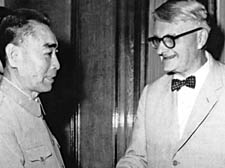|
|
 |
| |
 Joseph Needham meeting Zhou Enlai in Beijing in 1964, shortly before the Cultural Revolution Joseph Needham meeting Zhou Enlai in Beijing in 1964, shortly before the Cultural Revolution |
Science genius who discovered ancient China had the answers
Joseph Needham’s multi-volume history of China told of the country’s ground-breaking discoveries – but the big question of why the development stopped remains a mystery,
writes Frances Wood
Bomb, Book and Compass: Joseph Needham and the great secrets of China.
By Simon Winchester. Viking
TO anyone lucky enough to hear him talk about the history of science in China, Joseph Needham remains an unforgettable figure.
Tall, somewhat bulky in old age but with a schoolboy shock of thick white hair and owlish glasses, he was almost a caricature of the absent-minded professor.
If you add, as his biographer Simon Winchester does, a passion for nude bathing, morris dancing and Chinese girls, an even more unforgettable figure is created.
Born in 1900, Joseph Needham enjoyed a remarkable career as an embryologist at the University of Cambridge and was made a fellow of the Royal Society in 1941. His greatest achievement, however, is his multi-volume, massively wide-ranging history, Science and Civilisation in China.
For any of us working in the China field, this is the first port of call for any scientific enquiry, whether it be on the use of white lead in cosmetics in China, double-cropping rice or ceramic technology.
The first volume appeared in 1954 and the work is not yet finished, despite Needham’s death in 1992.
The whole project grew from the day in 1937 when three young Chinese science students called on Needham in Cambridge. Perennially susceptible to a pretty face, Needham was particularly fascinated by Lu Guizhen, a biochemist from Nanjing.
As the Japanese advanced across China, and after Pearl Harbour, Needham was selected to go to China on behalf of the British Council, to find out what his Chinese colleagues needed. He travelled widely, visiting the exiled University of Wuhan in deepest Sichuan where the plant physiologist made his laboratory apparatus out of scrap metal.
Needham was happy to be able to deliver a cathode-ray oscilloscope which “delighted the hearts of the excellent physicists in Kunming”, a “few grams of colchines” which “made all the difference to life at the Sichuan Province Agricultural Experiment Station” and rubber tubing for a university in Fujian where “all research was coming to a stop because of the perishing of their previous stock”.
As he travelled throughout wartime China, he observed. In Kunming, he noted that the ancient gardener performed “elaborate grafting techniques on the plum trees”. These differed from his father’s earlier efforts on the apple tree in their Clapham back garden so he wrote himself a reminder to check ancient Chinese texts on grafting.
This method, combining observation with reference to a broad range of ancient Chinese texts, remained the fundamental approach in Science and Civilisation in China.
The volumes were further enhanced by Needham’s encyclopaedic knowledge of the history of European science as he sought to demonstrate the advances of Chinese science and the transmission of ideas.
Having established China’s reputation for technical advance – showing how Chinese bridge-building, whether releasable, iron-chain suspension or in segmental arches, was far in advance of contemporary European construction, how China made paper more than 1,000 years before the technology was transmitted to Europe through the Arab world, or how Chinese sailors used magnetic compasses long before their European counterparts, almost inadvertently – he raised the so-called “Needham question” which was why, after such a promising start, China failed to continue the development?
The question is still hotly debated and the answer may lie with theoretical mathematics.
What Needham has given us is the vast array of scientific achievements of historic China and the vast literature that survives.
Most of it has not been translated but the content becomes accessible through Science and Civilisation in China and Needham’s elegant, faintly antiquated prose.
His bibliographies, in Chinese, both ancient and modern, in Japanese and many European languages, reveal a man of extraordinarily wide reading and offer useful directions for further research. And, quite apart from his own scholarship, Needham helped to support that of others. Approached for help by Julian Huxley in 1946, Needham is said to have been the person who put the S in UNESCO, creating the United Nations Educational, Scientific and Cultural Organisation which had previously ignored science.
Needham’s private life was unusual in that his wife Dorothy, a fine scientist in her own right whom he married in 1924, seemed to accept the constant presence of Lu Guizhen and China in his life. He, too, remained devoted to Dorothy, patiently sitting with her during her last years when she recognised no one else and waiting a respectable two years after her death before he married Lu Guizhen in 1989.
His time in China deepened a commitment to the Left that he had felt since his school days, and was combined with left-wing Christianity as practised by the “red vicar” of Thaxted; he once confused a German journalist with the assertion (in German) that he was a “Christian Socialist”, though his views were far from those of the right-wing Bavarian party.
Simon Winchester devotes considerable space to Needham’s private life and also to an area where question marks still abound – his trip to China in 1952 to investigate the allegation that chemical and biological warfare had been used by the US in Korea.
It all combines to portray a very unusual man: a scientific genius, a brilliant sinologist and historian whose contribution to western understanding of China is unrivalled.
• |
| |
|
 |
 |
|
 |
|
 Joseph Needham meeting Zhou Enlai in Beijing in 1964, shortly before the Cultural Revolution
Joseph Needham meeting Zhou Enlai in Beijing in 1964, shortly before the Cultural Revolution 
